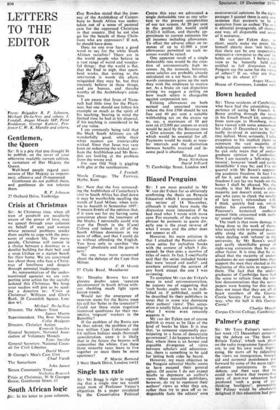Single tax rate
Sir: Mr Bragg is right in suggest-, ing that a single rate tax would meet most of Professor Vaizey's objectives. In a paper circulated by the Conservative Political
Centre this year we advocated a single deductable rate as one solu- tion to the present complexities of our tax system. At 20 per cent in the pound this would yield f5,621.4 million, and thereby ap- proximate to current estimates for all incomes including allowances. To offset the adverse effect on in- comes of up to £1,000 a year allowances permitted on such in- comes would be raised.
One apparent result of a single deductable rate would be the crea- tion of astronomically high in- comes. At the moment, however, some salaries are probably already calculated on a net basis. In other words companies gross up the sum they wish the employee to receive net. As a brake on vast disparities arising we suggest a ceiling on how much salary is chargeable against corporation tax.
Existing allowances on both earned and unearned income (where the first £500 should be tax free and 40 per cent a suitable withholding tax on the excess up to, say, a maximum of 50 per cent on £12,000 per annum or over) would be paid by the Revenue into a Giro account, the possession of which would be essential for all. Payments would be made at regu- lar intervals and the distinction between benefits received and in- come paid is absolute.






































 Previous page
Previous page